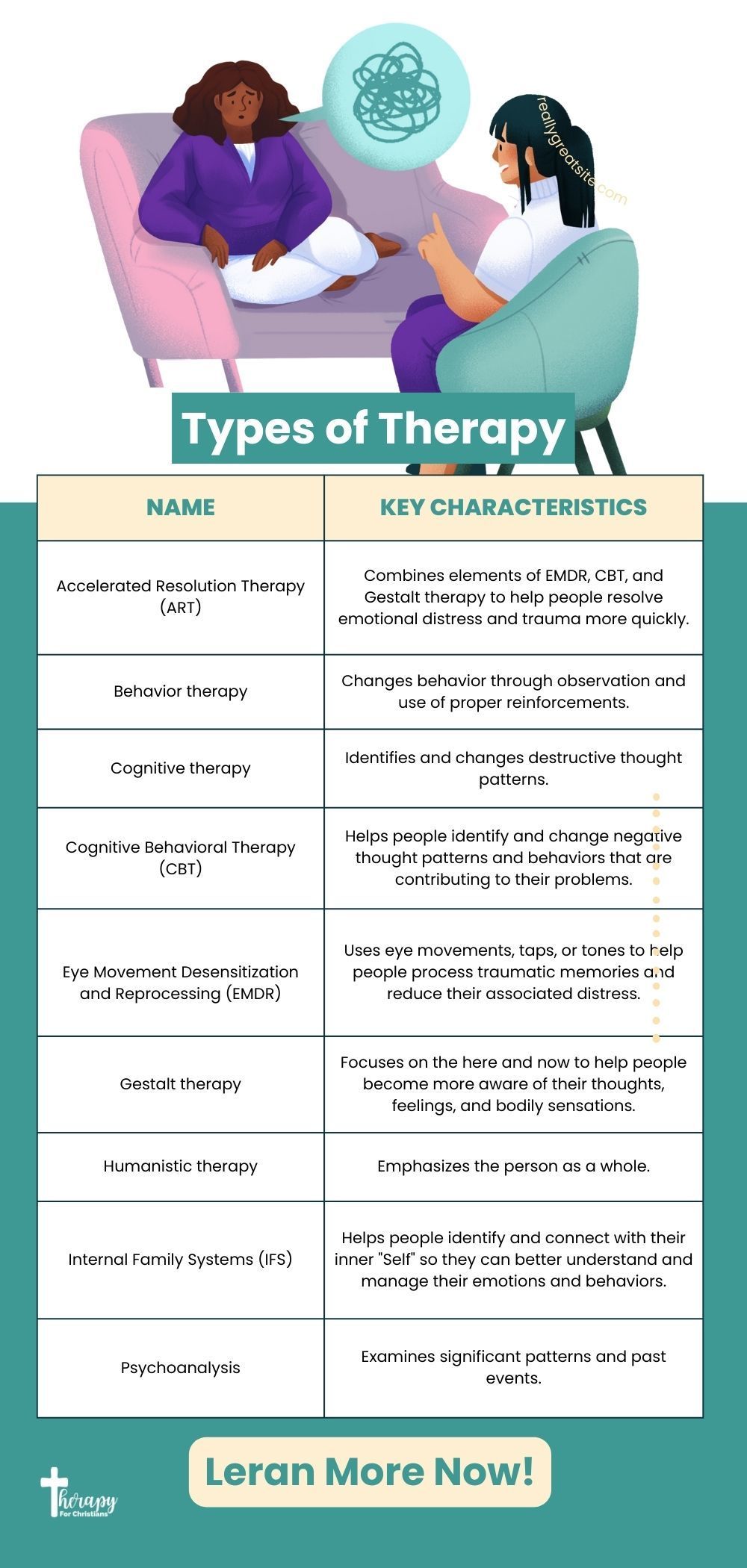
 Therapy offers many ways to improve mental health and overall well-being. Each approach can help you heal and grow from traditional practices to new methods. In this blog post, we explore different types of Therapy. Whether you want to reduce anxiety, overcome past traumas, or live a more fulfilling life, understanding these therapies is the first step to positive change.
Therapy offers many ways to improve mental health and overall well-being. Each approach can help you heal and grow from traditional practices to new methods. In this blog post, we explore different types of Therapy. Whether you want to reduce anxiety, overcome past traumas, or live a more fulfilling life, understanding these therapies is the first step to positive change.
Come and learn about different types of Therapy that can help us feel better. We'll talk about cognitive-behavioral Therapy, which is based on evidence, and art therapy, which uses creativity. We'll also see how these therapies can be customized for each person to promote healing for the mind, body, and spirit.
Our goal is to give you knowledge that helps you make intelligent decisions about the type of Therapy that suits your circumstances and goals. Whether you're a mental health professional expanding your skills or an individual on a personal growth journey, this blog is your complete guide to different therapeutic approaches. Let's embark on this enlightening journey together and discover the transformative power of various types of Therapy.

Types of Therapies That Bring Healing
Before diving into the specific types of therapies, it's essential to understand that Therapy is a highly personal experience, and what works best for one person may not work as well for another. Each therapeutic approach has its unique methodology, advantages, and techniques. Therefore, it's vital to approach this exploration with an open mind and consider how each type might align with your individual needs, personality, and life circumstances. Now, let's delve into the various types of therapeutic methods that have been proven to facilitate healing and personal growth.
Cognitive Behavioral Therapy (CBT)
CBT is a form of psychotherapy based on the idea that our thoughts, feelings, and behaviors are all interconnected. It focuses on identifying and changing patterns in negative thinking that may be causing distress or interfering with living life to its fullest potential. This type of Therapy also helps you develop healthy coping skills for situations that may trigger these cognitive patterns. CBT is evidence-based, meaning its efficacy has been tested and supported by research. It is a highly effective Therapy for many mental health issues, including depression, anxiety, eating disorders, and addiction.
Psychodynamic Therapy
Psychodynamic Therapy is talk therapy examining how unconscious thoughts and feelings influence behavior. This approach focuses on the underlying emotions and motivations behind one's behavior rather than just the behaviors themselves. It also seeks to identify patterns in our thinking, feeling, and behavior that can lead to inner turmoil or distress. By examining these patterns, psychodynamic Therapy can help a person gain insight into their behavior and develop healthier ways of dealing with difficult situations. This form of Therapy is often used for issues such as depression, anxiety, trauma, addiction, and relationship problems.
Couples Counseling
Couples counseling is a Therapy designed to help couples build better communication skills and improve their relationship. It can address common issues such as trust, jealousy, infidelity, and parenting styles. Couples counseling also helps partners learn how to manage conflicts positively rather than resorting to harmful behaviors like aggression or avoidance. This approach can be invaluable for couples who want to restore trust, rebuild intimacy, and create more fulfilling relationships.
Mindfulness Practices
Mindfulness is being aware and present at the moment without judgment. It encourages us to observe, accept, and embrace our experiences with kindness and compassion. Mindfulness can be used on its own as a form of Therapy or as an adjunct to other therapies. Research has shown that mindfulness practices such as meditation, yoga, and breathing exercises can promote relaxation, reduce stress, and boost overall well-being. It can also help to improve concentration and decrease intrusive thoughts that can lead to anxiety. Mindfulness is an excellent form of Therapy for those looking for a holistic approach to healing.
Psychoanalytic Therapy
Psychoanalytic Therapy is based on the words and works of psychoanalyst Sigmund Freud. This type of Therapy focuses on understanding unconscious motives, conflicts, and defenses to gain insight into behavior and develop better self-awareness. It also explores early life experiences that may influence current thoughts and behaviors. The goal of psychoanalytic Therapy is to recognize and change problematic patterns so that a person can live a more fulfilling life. It is often used for depression, anxiety, trauma, and relationship problems.
Sex therapy
Sex therapy is a form of psychotherapy that helps individuals and couples address sexual issues. It can help people improve their communication skills and better understand their desires, needs, and preferences. Sex therapists may also use hypnosis, biofeedback, or other techniques to help people overcome past traumas or medical conditions that interfere with the enjoyment of sex. This type of Therapy is a valuable resource for anyone looking to address sexual issues that negatively affect their life.
Accelerated Experiential Dynamic Psychotherapy (AEDP)
AEDP is a form of psychotherapy that aims to foster transformational experiences in an atmosphere of safety and compassion. It prioritizes the patient's therapeutic relationship and emotional experience to reduce anxiety, expand the emotional repertoire, and promote self-awareness. AEDP is effective for many issues, including trauma, depression, and anxiety disorders.

Accelerated Resolution Therapy (ART)
ART is an evidence-based psychotherapy combining exposure therapy, cognitive restructuring, and eye movement desensitization reprocessing (EMDR). ART works by rapidly targeting the source of psychological distress and reducing symptoms quickly. It has proven highly effective in treating PTSD, depression, anxiety disorders, and phobias. This type of Therapy is gaining traction as a safe, non-invasive treatment for those seeking to reduce the intensity of their symptoms in days rather than weeks or months.
Acceptance and Commitment Therapy (ACT)
ACT is a mindfulness-based psychotherapy that encourages people to accept their thoughts, feelings, and behaviors to create meaningful change. It focuses on helping individuals become aware of the mental processes that can cause distress and then guiding them to take action in line with their values. ACT has been proven effective in treating various issues, such as substance abuse, anxiety disorders, and borderline personality disorder. It is also essential to comprehensive mental health treatment plans for those with chronic or severe mental illness. Additionally, ACT can be used with other forms of Therapy to create a more holistic approach to healing.
Adlerian Psychology Animal Assisted Play Therapy (AAPT)
AAPT is an alternative form of psychotherapy that uses the presence of animals to facilitate treatment. This type of Therapy is particularly effective for children with psychological issues, such as depression or anxiety. During AAPT sessions, children engage in activities with certified therapy animals while their therapist works on building trust and teaching coping skills. Play-based Therapy helps children learn how to regulate their emotions, communicate more effectively, and better understand the world around them. AAPT is also a valuable tool for those dealing with attachment, trauma, or substance abuse issues.
Applied Behavior Analysis (ABA)
ABA is an evidence-based form of treatment that uses principles of behavior to promote desired behaviors and reduce unwanted ones. This type of Therapy has been used to treat a wide range of mental health issues, including autism spectrum disorders, anxiety, depression, and substance use disorders. ABA focuses on teaching new skills while reinforcing positive behaviors through rewards and incentives. It can also help individuals struggling with anger management, social skills, and impulse control. ABA is an effective way to teach positive behaviors in a safe and supportive environment.
Art Therapy
Art therapy is a form of psychotherapy that uses art to express feelings and explore issues. It can be used for any issue, from mental health concerns such as depression and anxiety to physical ailments such as chronic pain or disabilities. Art therapists work with their clients to create meaningful art pieces to help them process emotions, gain insight, and develop problem-solving skills. Art therapy is valuable for those seeking creative ways to heal and improve their overall well-being.
Attachment-Based Therapy
Attachment-based Therapy is a type of psychotherapy that focuses on forming secure attachment bonds with patients. It emphasizes the importance of having strong, healthy relationships and providing a safe therapeutic environment for patients to explore their emotions and experiences. Attachment-based Therapy is particularly effective in treating depression, anxiety, post-traumatic stress disorder (PTSD), and substance use disorders. It is also an essential part of treatment for individuals who have experienced trauma, as it helps build trust and create a sense of safety. This type of Therapy can be used alongside other forms of treatment, such as medication or dialectical Behavioral Therapy (DBT).)-(3).jpg)
Biofeedback
Biofeedback is a type of psychotherapy that uses technology to help people become aware of their physiological responses. This Therapy can treat various conditions, such as anxiety, hypertension, chronic pain, and sleep disorders. During biofeedback sessions, individuals are connected to specialized instruments that measure their body's reactions while they practice relaxation techniques. This helps them become aware of their body's signals, so they can consciously control their reactions and better manage their symptoms. Biofeedback is essential for those seeking greater self-awareness and improving their overall mental health.
Brainspotting
Brainspotting is a type of psychotherapy that uses eye movements to target and release unresolved emotional trauma. It is based on the idea that some brain regions hold onto traumatic memories and experiences, which can manifest in physical symptoms or psychological distress. During brain spotting sessions, individuals are guided by their therapist to focus on the details of their traumatic experience while making eye movements. This helps to process and release the emotional energy trapped in their body, leading to improved mental health outcomes. Brainspotting is integral to comprehensive treatment plans for those suffering from trauma-related issues and other psychiatric disorders.
Breathwork
Breathwork therapy is a form of therapeutic practice that involves engaging in specific breathing exercises and patterns. This technique can be beneficial in managing stress and anxiety, reducing symptoms of mood disorders, and aiding in substance abuse treatment by helping individuals tap into a deeper level of self-awareness and relaxation
 Health Ads by
Health Ads by
Career Counseling
Career Counseling is a specialized type that helps individuals explore career options and make informed decisions about their professional future. It can be particularly beneficial for patients struggling with mental health issues affecting their occupational functioning or those recovering from substance abuse trying to reintegrate into the workforce.
Chairwork
Chairwork is a therapeutic technique often used in cognitive behavioral Therapy. It involves using two chairs where the client moves between them to explore different perspectives or roles. It is effective for processing past traumas, confronting self-critical thoughts, and managing borderline personality disorder.
Child-Parent Psychotherapy
Child-Parent Psychotherapy (CPP) is a therapeutic approach that focuses on the relationship between a child and a parent or primary caregiver. This approach can be used for families dealing with trauma, loss, or mental health issues and is designed to support both the child's and parent's mental health.
Christian Counseling
Christian Counseling is a type of Therapy that integrates biblical teachings with psychological principles. It offers help to those who desire to align their treatment with their Christian faith, dealing with various issues, including psychiatric disorders, substance abuse, and mood disorders.
Client-Centered Therapy
Client-Centered Therapy, also known as person-centered Therapy, is a non-directive form of talk therapy developed by humanist psychologist Carl Rogers. It helps the patient take the lead in discussing their issues, fostering a safe and accepting environment to explore and resolve their problems.
Cognitive Behavioral Therapy-Insomnia (CBT-I)
Cognitive Behavioral Therapy for Insomnia (CBT-I) is a structured program that helps you identify and replace thoughts and behaviors that cause or worsen sleep problems with habits that promote sound sleep. It is very effective and can be a good treatment choice for those with chronic sleep difficulties.
Cognitive Processing Therapy (CPT)
Cognitive Processing Therapy (CPT) is a cognitive behavioral Therapy that helps people recover from post-traumatic stress disorder (PTSD) and related conditions. It is a highly structured therapy consisting of 12 sessions that help the patient understand and change their thoughts about their trauma.
Compassion Focused Therapy (CFT)
Compassion-Focused Therapy (CFT) is a form of Therapy that aims to help those who struggle with shame and self-criticism. It employs various strategies and techniques from cognitive behavioral therapy, social psychology, and neuroscience to foster self-compassion and, ultimately, better mental health.
Core Energetics
Core Energetics is a branch of body psychotherapy that combines spiritual development with psychological healing. It aims to restore the body's energy flow, promoting emotional wellness and mental health.
Dance Movement Therapy
Dance Movement Therapy is a therapeutic modality that uses movement to support the body's intellectual, emotional, and motor functions. It is often used in mental health services to offer a holistic approach to healing and recovery.
Dialectical Behavior Therapy (DBT)
Dialectical Behavior Therapy is a cognitive-behavioral Therapy that teaches skills to cope with stress, regulate emotions, and improve relationships with others. It is especially effective in treating borderline personality disorder and other mood disorders.
Drama Therapy
Drama Therapy is an active and experiential approach that uses role-play, theater games, and performances to facilitate personal growth and promote mental health.
Dreamwork
Dreamwork is a therapeutic technique that interprets dreams to gain insight into the subconscious. It has found applications in treating psychiatric disorders, including anxiety and depression.
Eclectic Therapy
Eclectic Therapy integrates elements from different therapy approaches and tailors the treatment according to each client's needs. It is often employed in mental health institutions to offer customized treatments.
Ecotherapy
Ecotherapy, or nature therapy, is a form of treatment that involves activities in the natural environment to boost mental health. This can be effective in managing stress, depression, and anxiety.
Emotional Support Animal Certification
Emotional Support Animal Certification involves using animals to provide comfort and support through affection and companionship for individuals suffering from various mental and emotional conditions.
Emotionally Focused Couples Therapy
Emotionally Focused Couples Therapy is a structured approach to couples therapy formulated in the early 80s by Drs. Sue Johnson and Les Greenberg. The Therapy focuses on creating and strengthening the emotional bond between partners by establishing a secure and lasting attachment.
Enhanced Cognitive Behavior Therapy (CBT-E)
Enhanced Cognitive Behavior Therapy is a version of CBT adapted for eating disorders. CBT-E targets the maintaining mechanisms of eating disorders to bring about change and recovery.
Equine-Assisted Therapy
Equine-Assisted Therapy involves interactions with horses to promote human physical and mental health. The process of grooming and taking care of horses is therapeutic in itself.
Executive Function Coaching
Executive Function Coaching is a form of Therapy that assists in developing cognitive skills necessary for students to succeed in education.
Existential Therapy
Existential Therapy is a unique form of psychotherapy that looks at individuals from a philosophical perspective, focusing on the human condition as a whole.
Exposure and Response Prevention (ERP)
Exposure and Response Prevention is a form of cognitive-behavioral Therapy specifically designed for obsessive-compulsive disorder (OCD), where the patient is exposed to their fear or obsession and then prevented from performing their usual compulsive response.
Eye Movement Desensitization and Reprocessing Therapy (EMDR)
Eye Movement Desensitization and Reprocessing Therapy is a form of psychotherapy that helps individuals heal from the symptoms and emotional distress of traumatic life experiences.
Family Systems
Family Systems Therapy is a form of psychotherapy that helps individuals resolve their problems in the context of their family units, where many issues are likely to begin.
Family Therapy
Family Therapy focuses on solving significant problems that prevent a family from functioning normally and healthily. This form of Therapy insists on family relationships as an essential factor in psychological health.
Feminist Therapy
Feminist Therapy is a form of psychotherapy that emphasizes the societal context of individual experiences focusing on gender and sociopolitical power. It promotes empowerment and self-efficiency, allowing individuals to confront and challenge societal norms contributing to psychological distress.
Functional Medicine
Functional Medicine is an integrative approach to health that focuses on identifying and addressing the root causes of disease rather than curing isolated symptoms. Emphasis is placed on patient-centered care, promoting health as a positive vitality rather than merely the absence of disease.
Gestalt Therapy
Gestalt Therapy is a form of psychotherapy focused on personal responsibility, present-moment awareness, and the relationship between the individual and the environment. It helps individuals gain self-awareness and acceptance, promoting personal growth and change.
Gottman Method
The Gottman Method is a form of couple's Therapy that assists couples in achieving a more profound sense of understanding, connection, and intimacy in their relationships. It is grounded in research and involves practical, goal-oriented, and scientifically-based interventions.
Habit Reversal Therapy
Habit Reversal Therapy is a cognitive-behavioral Therapy designed to help people break unwanted habits such as nail-biting, hair-pulling, or skin-picking. It focuses on building awareness about triggering situations and developing alternative responses.
Hakomi Therapy
Hakomi Therapy is a method of body-centered psychotherapy that combines Western psychology with Eastern spiritual practices. It promotes mindfulness, nonviolence, and the unity of mind and body.
Health At Every Size
Health At Every Size (HAES) is a movement that promotes acceptance of all body shapes and sizes, challenging societal norms and biases that equate thinness with health. It encourages balanced eating, physical activity, and respect for body diversity.
Holistic Therapy
Holistic Therapy is an approach to treatment that addresses the individual, integrating physical, mental, and spiritual aspects of well-being. It employs various therapeutic techniques such as yoga, acupuncture, massage, and nutrition counseling.
Humanistic Therapy
Humanistic Therapy is a psychological perspective that emphasizes the individual's inherent drive towards self-actualization, a process of realizing and expressing one's capabilities and creativity. It promotes personal growth, self-understanding, and freedom of choice.
Hypnotherapy
Hypnotherapy uses the power of suggestion while in a state of deep relaxation to bring about subconscious change to thoughts, feelings, and behavior. It can effectively manage anxiety, stress, and phobias and break harmful habits.
Imago Relationship Therapy
Imago Relationship Therapy is a form of relationship therapy that encourages individuals to explore their early childhood experiences better to understand their patterns of interaction in adult relationships. It helps partners develop empathic understanding and effective communication.
Infertility Counseling
Infertility Counseling provides emotional support to individuals or couples dealing with infertility. It offers assistance in coping with the emotional stress and complex decisions associated with infertility and fertility treatments.
Integrative Therapy
Integrative Therapy is a progressive form of psychotherapy that combines different therapeutic tools and approaches to fit the individual client's needs. This therapeutic approach views the person as a whole, integrating emotional, behavioral, cognitive, physical, and spiritual aspects of well-being.
Internal Family Systems (IFS)
Internal Family Systems is a type of psychotherapy that views the mind as a collection of subpersonalities, or parts, each with its unique viewpoint and qualities. It fosters self-awareness and self-leadership to help individuals heal and become their true selves.
Interpersonal Therapy (IPT)
Interpersonal Therapy is a short-term form of treatment that helps patients understand and address current problems in interpersonal relationships. It has been found effective in treating depression and certain other mood disorders.
Intuitive Eating
Intuitive Eating is an approach that teaches you how to create a healthy relationship with your food, mind, and body. It encourages individuals to trust their internal signals of hunger, fullness, and satisfaction while dismissing external food rules or regulations.
Jungian Therapy
Jungian Therapy, derived from the theories of Carl Jung, aims to bring an individual's unconscious into consciousness, helping the individual to attain a balanced personality. It involves dream analysis and personal exploration to foster personal growth and self-realization.
Ketamine Assisted Therapy
Ketamine Assisted Therapy is a novel approach in psychotherapy that involves using low doses of ketamine, a dissociative anesthetic, in conjunction with psychotherapy. It has shown promising results for treatment-resistant depression and some forms of anxiety.
Life Coaching
Life Coaching involves assisting individuals in making progress in their lives to attain greater fulfillment. Life coaches aid their clients in improving their relationships, careers, and day-to-day lives by helping them clarify their goals and overcome obstacles.
Marriage Counseling
Marriage Counseling, also known as couples therapy, involves helping couples — married or not — to improve their relationships by addressing issues such as communication, conflict resolution, and relationship dynamics.
Mindful Self-Compassion (MSC)
Mindful Self-Compassion is a psychological therapeutic approach that encourages individuals to treat themselves with kindness, understanding, and acceptance. This approach combines the skills of mindfulness and self-compassion to enhance our capacity for emotional well-being.
Mindfulness-Based Cognitive Therapy (MBCT)
Mindfulness-Based Cognitive Therapy is an innovative, empirically validated treatment program designed to prevent relapse in people who have recovered from unipolar depression. It integrates mindfulness practices with elements from cognitive Therapy.
Mindfulness-Based Stress Reduction (MBSR)
Mindfulness-Based Stress Reduction is a therapeutic intervention that focuses on mindfulness meditation to help people manage pain and stress, particularly in those with chronic conditions. It adopts a holistic approach toward health and wellness.
Motivational Interviewing
Motivational Interviewing is a counseling method that helps people resolve ambivalent feelings and insecurities to find the internal motivation they need to change their behavior. It is a practical, empathetic, and short-term process.
Multicultural Therapy
Multicultural Therapy recognizes and incorporates the importance of culture, assessment, and intervention at every level. It values diversity, promotes social justice, and aims to increase cultural competence.
Music Psychotherapy
Music Psychotherapy is an interpersonal experience in which trained music therapists use music and its facets—physical, emotional, mental, social, aesthetic, and spiritual—to help clients improve their health in cognitive, motor, emotional, communicative, social, sensory, and educational domains.
Narrative Therapy
Narrative Therapy is a form of Therapy that aims to separate the individual from the problem and encourages people to rely on their own skill sets to minimize the problems that exist in their lives.
Non-directive Play Therapy
Non-directive Play Therapy, also known as Child-Centered Play Therapy, uses play to express feelings and experiences. The therapist does not direct the child or make decisions but instead follows the child's lead.
Object Relations Therapy
Object Relations Therapy is a psychoanalytical theory that suggests how people relate to others and situations in their adult lives are shaped by family experiences during infancy.
Parent-Child Interaction Therapy (PCIT)
Parent-Child Interaction Therapy is an evidence-based treatment for young children with emotional and behavioral disorders that emphasizes improving the quality of the parent-child relationship and changing parent-child interaction patterns.
Pastoral Counseling
Pastoral Counseling integrates both psychological and theological concepts into its approach. It seeks to establish an empathetic relationship to assist individuals in dealing with life’s issues, focusing on the spiritual aspects.
Person-Centered Therapy
Before diving into the different types of Person-Centered Therapy, it's crucial to understand its foundations. Person-Centered Therapy, also known as Rogerian Therapy, is a non-directive talk therapy developed by Carl Rogers. It shifts the responsibility of the therapeutic process to the client, promoting self-discovery and self-acceptance. The therapist provides an empathetic and judgment-free environment, emphasizing unconditional positive regard, genuineness, and empathetic understanding. This approach believes in the inherent striving of each individual towards growth and fulfillment of their potential. Now, let's explore some of the types of Person-Centered Therapy.
Polyvagal Theory
Polyvagal Theory is an approach that supports understanding the autonomic nervous system's role in social behavior and emotional regulation. It provides insights into how the body's automatic reactions impact our emotions and relationships.
Positive Psychotherapy
Positive Psychotherapy is an approach that focuses on the strengths and virtues that enable individuals to thrive. Rather than just focusing on healing mental illness, it aims to build happiness and fulfillment.
Premarital Counseling
Premarital Counseling helps couples prepare for marriage. It aids in developing conflict resolution skills, improving communication, aligning expectations, and understanding each other better, promoting satisfying and enduring marriages.
Prolonged Exposure (PE)
Prolonged Exposure is a specific type of cognitive-behavioral treatment that helps individuals to confront their fears. It is particularly effective for treating post-traumatic stress disorder (PTSD).
Psychiatric Evaluation and Medication Management
Psychiatric Evaluation and Medication Management involves diagnosing mental health conditions and managing the use of medications to treat these conditions. It requires regular consultations and monitoring of the patient's progress.
Psychobiological Approach to Couples Therapy (PACT)
PACT is a fusion of attachment theory, developmental neuroscience, and arousal regulation. This approach to couples therapy helps partners to understand their partner's brain and body reactions, fostering secure-functioning relationships.
Rational Emotive Behavior Therapy (REBT)
REBT is a comprehensive, active-directive, philosophically, and empirically based psychotherapy that focuses on resolving emotional and behavioral problems and disturbances.
Reiki Relational Therapy
Reiki Relational Therapy involves using Reiki, a form of energy healing, within the therapeutic relationship. It aims to balance energy fields in the body, enhancing overall well-being.
Sand Tray Therapy
Sand Tray Therapy is a form of expressive Therapy that uses a sandbox and miniature figurines, enabling a person to construct their microcosm of life.
Schema Therapy
Schema Therapy is an integrative approach to treatment that combines the best aspects of cognitive-behavioral, experiential, interpersonal, and psychoanalytic therapies into one unified model.
Sensorimotor Therapy
Sensorimotor Therapy combines body awareness with cognitive therapy techniques, aiming to resolve the limitations of unresolved trauma.
Solution Focused Therapy
Solution Focused Therapy is future-focused, goal-directed, and focuses on solutions rather than on the problems.
Somatic Experiencing (SE)
Somatic Experiencing is a body-oriented approach to healing trauma and other stress disorders. It is a potent method for resolving trauma symptoms and relieving chronic stress.
Somatic Therapy
Somatic Therapy is a form of body-centered Therapy that looks at the connection of mind and body and uses both psychotherapy and physical therapies for holistic healing.
Sports Psychology
This branch of psychology focuses on the impact of psychological factors on athletic performance. It explores ways to increase athletes' motivation, improve their mental well-being, and enhance their performance using visualization and relaxation techniques.
Strength-Based Therapy
This therapeutic approach emphasizes individuals' strengths and competencies rather than deficiencies and weaknesses. It helps people construct a positive self-concept and work towards personal growth and improvement.
Supportive Therapy
This form of Therapy aims at improving an individual's coping mechanisms and increasing their resilience. It provides emotional support, improves self-esteem, and helps individuals navigate life's challenges.
Emotional Freedom Technique (Tapping)
This form of psychological acupressure uses tapping on specific points on the body to relieve emotional distress. It's believed to balance the energy system and treat physical and psychological issues.
TEAM-CBT
TEAM-CBT stands for Testing, Empathy, Agenda setting, and Methods. It is a framework for cognitive-behavioral Therapy that emphasizes the therapeutic alliance, patient-therapist collaboration, and measurement of progress throughout the therapy process.
Therapeutic Journaling
This Therapy encourages individuals to express their thoughts and feelings through writing. It's a form of self-exploration that can enhance self-awareness, foster emotional healing, and improve mental health.
Transference Focused Psychotherapy
This form of Therapy is primarily used to treat borderline personality disorder. It focuses on the relationship between the patient and therapist to explore and understand the patient's emotions and interpersonal difficulties.
Transpersonal Therapy Trauma Resiliency Model
According to mental health services administration, this group therapy approach integrates spiritual and psychological aspects of the human experience. It aims to promote psychological health and foster spiritual growth.
Trauma-Focused CBT
This type of cognitive-behavioral Therapy explicitly addresses traumatic events' emotional and mental health consequences. It helps individuals develop coping strategies and resilience.
Wellness Recovery Action Plan (WRAP)
WRAP is a self-designed prevention and wellness tool individuals can use to manage their mental health. It helps individuals monitor distressing symptoms and plan responses to reduce or prevent escalating distress.
Yoga Therapy
Yoga incorporates physical postures, breath control, and meditation to promote physical strength, relaxation, and mental clarity. In a therapeutic context, yoga can manage stress, reduce anxiety, and enhance well-being.
Final Thoughts on the Above Therapeutic Approach
Please note that the descriptions provided above are brief overviews of each therapeutic approach and may only capture some nuances and details of each approach. Additionally, many therapists use a combination of techniques from different types of Therapy based on their expertise and the specific needs of their clients. If you are looking for a counselor near you, you can search our database of counselors and life coaches here:
Before you leave, we would appreciate it if you helped us spread the word by sharing, tweeting, pinning, etc. this post.
Help us increase mental health awareness in the Christian community by donating through our paypal link here: www.paypal.com/therapyforchristians, joining our mailing list by clicking below, or join our provider list here: Provider listing
Disclaimer: the information, including but not limited to, text, graphics, images and other material contained on this article are for informational purposes only. No material on this site is intended to be a substitute for professional medical advice, diagnosis or treatment. If you are looking for a Christian counselor near you, please check out our directory located here: Christians Therapist Near Me
.png)
.jpg)










